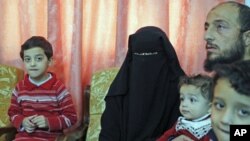Syria on Monday called the Arab League decision to suspend its membership illegal, but the reaction likely will do little to stem the growing isolation of the Assad government during its violent crackdown on political dissent.
Foreign Minister Walid al-Moallem called Syria's suspension from the Arab League a very dangerous step that was incited by the United States.
The top Syrian diplomat said his country is implementing an Arab League peace plan to remove its troops from the streets, release political prisoners and engage in dialogue with the opposition.
Syria disputes suspension
He also argued that the charter of the 22-nation league calls for all members to vote for suspension. Yemen and Lebanon voted against the Saturday decision, while Iraq abstained.
Despite the criticism by fellow Arab countries, Moallem expressed confidence that Syria would be protected from wider action against it. He said allies Russia and China would block any international attempt to move against his government.
Russian Foreign Minister Sergei Lavrov said Monday that Moscow opposes the Arab League suspension of Syria. China urged Syria to implement the Arab League peace plan.
Criticism grows lounder
But condemnation of Syria continues to grow beyond the Arab world, after supporters of the Syrian government attacked a number of embassies in Damascus on Saturday and Sunday.
Turkey's Foreign Minister Ahmet Davutoglu said Ankara will take decisive action in response to attacks on its diplomatic missions in Damascus, Aleppo and Latakia, and he pledged continued support of the Syrian people in what he called their "rightful struggle."
Nadhim Shehadi, a Syria expert at the research group Chatham House, said the consistency of the message to Syria's President Bashar al-Assad is key to ending the government's violent crackdown on dissent.
"The regime had been gaining strength because of the contradictory positions from the international community and from the Arab League and from the regional powers. So, one day they want him to reform. One day they want dialogue. Sometimes they tell him to step aside, and [then] tell him again about dialogue. So all this hesitation gave the regime further strength," said Shehadi.
Eroding support, less dialogue
Shehadi, speaking from Beirut, said the loss of support in the regional alliance Syria helped found will mean more than any sanctions the league is threatening.
"What we should look for is more eroding the legitimacy, rather than eroding the economy or hitting at certain sectors of the population so that they would turn [against the government], because it is unpredictable how they will turn," said Shehadi.
The Arab League meets Wednesday, the day Syria's suspension is to take effect, to discuss sanctions it might add to those already imposed by Western nations.
The Syrian foreign minister repeated an invitation to league members to come to Damascus before then. League observers say the offer is likely to be turned down.
Some information for this report was provided by AP, AFP and Reuters.




